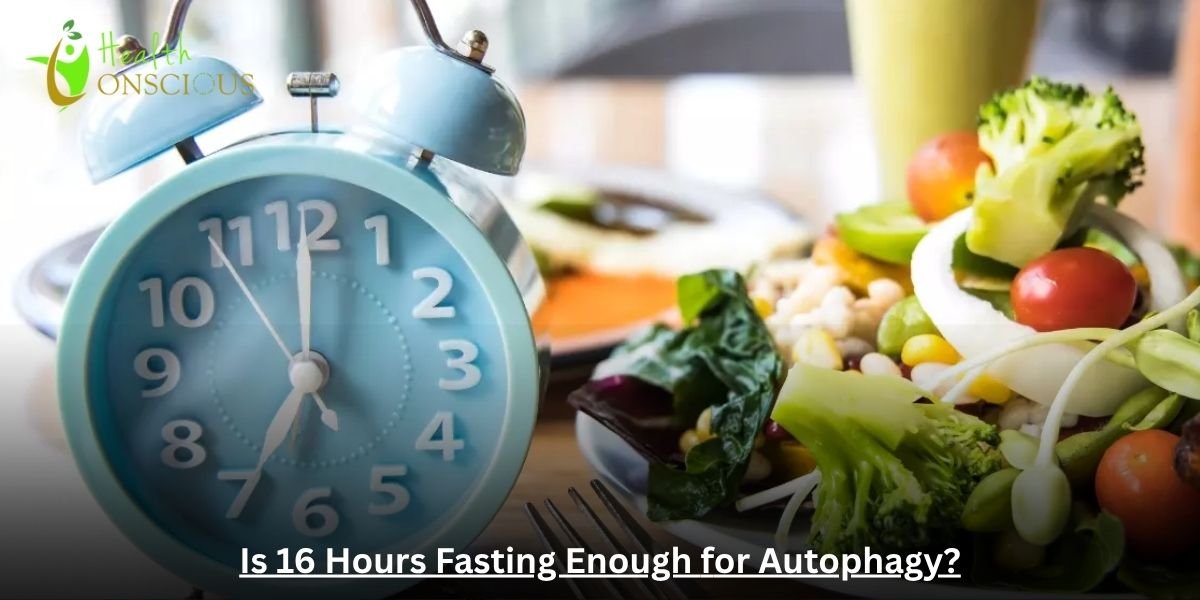If you’re exploring intermittent fasting, you’ve likely heard the term “autophagy.” This natural process is your body’s way of cleaning house, clearing out damaged cells and old proteins to make way for new, healthier ones. It’s a key benefit that many people seek through fasting.
But a common question arises: can a simple 16-hour fast be enough to trigger this deep cellular renewal? Let’s dive into the science behind autophagy and find out what it takes to get the most out of your fasting routine.
Key Takeaways
- A 16-hour fast can initiate the autophagy process, but research suggests its effects become more significant with longer fasting periods.
- Autophagy is your body’s cellular recycling system, triggered by periods of nutrient deprivation and stress, such as fasting.
- The exact time autophagy begins varies per person, but it generally increases gradually after the 12-hour mark.
- Benefits of autophagy include improved cellular health, reduced inflammation, and better brain function.
- To support autophagy, stick to zero-calorie drinks like water and black coffee during your fast.
What Is Autophagy Fasting?
Autophagy, which translates to “self-eating,” is your body’s natural deep-cleaning mechanism. It’s how your cells break down and recycle old, damaged parts to create new ones. This process is vital for cellular health, longevity, and protecting against disease.
Autophagy fasting uses periods of food restriction to intentionally activate this cleansing process. When you fast, your body doesn’t have a constant supply of food for energy. This lack of nutrients tells your cells to start looking for fuel internally, and they begin breaking down and “eating” dysfunctional components.
When Does Autophagy Start?
There’s no single magic moment when autophagy begins. Think of it less like an on/off switch and more like a dimmer. The process is always happening, but its activity ramps up significantly during a fast.
Many experts suggest that you can start to see some level of increased autophagy after 12 to 16 hours of fasting. At this point, your body has used up its readily available sugar and starts looking for other energy sources. However, the most powerful and measurable effects typically occur after 24 hours or more. The exact timing depends on factors like your metabolism and your activity level.
Is a 16-Hour Fast Enough for Autophagy?
Yes, a 16-hour fast can be enough to start the autophagy process, especially if you do it consistently. This popular form of intermittent fasting is an excellent starting point for anyone looking to get the benefits of cellular renewal. However, it’s important to understand the scale of the effect.
A 16-hour fast likely provides a gentle boost, not a complete overhaul. To get the most significant benefits, some studies suggest longer fasts are more effective. For example, a study published in Autophagy found that short-term fasting induces profound neuronal autophagy in the brain. Still, for a deeper cellular cleanse, many people choose longer fasts of 24-72 hours, done less frequently.
Signs Your Body May Be Undergoing Autophagy
While you cannot directly feel your cells “self-eating,” there are several signs and symptoms that your body has entered a state that promotes autophagy. These signs are often a result of the metabolic shifts that occur during fasting, such as the body entering ketosis.
- Increased Ketone Levels: As your body depletes its glucose and begins burning fat for fuel, it produces ketone bodies. Increased ketone levels are a strong indicator that your body is in a metabolic state known to stimulate autophagy. You can measure ketones with a blood, breath, or urine meter.
- Reduced Appetite: Many people find that their feelings of hunger decrease significantly after the initial phase of fasting. This is likely due to the regulation of hunger hormones like ghrelin and an increase in glucagon levels.
- Improved Mental Clarity: One of the most commonly reported benefits of fasting is enhanced focus and cognitive function. This may be linked to the brain-derived neurotrophic factor (BDNF), a protein that increases during fasting and is crucial for brain health.
- Weight Loss: As your body switches to using stored fat for energy, weight loss is a natural outcome. While not a direct sign of autophagy, it is often a parallel result of the same metabolic changes that induce cellular recycling.
Autophagy Benefits
Scientific research continues to uncover a wide range of health benefits associated with a properly functioning autophagy process. By clearing out cellular debris, autophagy plays a vital role in keeping your body’s systems running efficiently.
The evidence-backed benefits include:
- Cellular Rejuvenation and Longevity: Autophagy removes and recycles damaged cellular components, which helps to slow the aging process at a cellular level and may contribute to a longer “healthspan.”
- Enhanced Brain Function: By clearing out toxic protein aggregates associated with neurodegenerative diseases like Alzheimer’s and Parkinson’s, autophagy helps protect brain cells and can improve cognitive function.
- Improved Metabolic Health: Autophagy has been shown to enhance insulin sensitivity and blood glucose regulation, helping to prevent or manage conditions like type 2 diabetes and metabolic syndrome.
- Reduced Inflammation: Chronic inflammation is a root cause of many diseases. Autophagy helps to modulate inflammatory responses by removing dysfunctional immune cells and other inflammatory triggers.
- Immune System Enhancement: Autophagy supports a strong immune system by removing harmful organisms like bacteria and viruses and regenerating immune cells.
How Often Should You Fast to Promote Autophagy?
The frequency of fasting for autophagy depends on your personal health goals and lifestyle. You don’t necessarily need to fast for multiple days every week. Research suggests two main approaches for stimulating autophagy:
- Consistent, Shorter Fasts: Many people see benefits from incorporating regular 16-hour fasts into their routine. Doing this daily or most days of the week helps keep the autophagy process active consistently.
- Less Frequent, Longer Fasts: For those seeking to maximize the deep cleansing benefits of autophagy, a 24- to 72-hour fast, performed once or twice a month, can be highly effective. This approach is not for everyone and should be done with caution, especially if you’re new to fasting.
Listening to your body is crucial—establish a pace that feels both safe and sustainable. For some, a 16-hour daily fast is the perfect balance, while others may prefer a longer fast on occasion.
What to Drink and Eat for Autophagy Support
During a fasting window, the goal is to avoid anything that will spike insulin, as insulin signals the body to stop autophagy. A “clean fast” is the best way to support the process.
Allowed Beverages During the Fast:
- Water: Stay well-hydrated with plain water. Adding a pinch of sea salt can help replenish electrolytes.
- Black Coffee: Unsweetened, black coffee is generally considered safe as it has minimal calories and can even help stimulate autophagy.
- Plain Tea: Unsweetened herbal teas, green tea, or black tea are excellent choices.
Foods to Eat During Your Eating Window:
- Low-Carbohydrate and High-Fat Foods: A ketogenic-style diet can help promote ketosis and, by extension, autophagy. Prioritize healthy fats such as nuts, avocados, and olive oil.
- Polyphenol-Rich Foods: Compounds found in plants, such as those in berries, green tea, and turmeric, have been shown to help induce autophagy.
- Lean Protein: While excessive protein can inhibit autophagy, moderate amounts from sources like poultry and fish are essential for cellular repair and muscle maintenance.
Avoid all forms of sugar and alcohol, as they can quickly interrupt the autophagy process.
When a 16-Hour Fast Might Not Be Enough
While a 16-hour fast is a great way to introduce your body to the benefits of fasting and cellular renewal, there are situations where it may not be enough to achieve more profound autophagy.
- If your health goals involve deep cellular repair or specific disease prevention, a longer fast of 24-48 hours may be more effective.
- For those with a high-carb diet, the body might still have sufficient glucose to burn for energy even after 16 hours, potentially delaying the full onset of autophagy.
- Individual differences in metabolism and how quickly a person enters a fasted state mean that some people may simply require a longer window to get the most out of the process.
For these reasons, many people choose to cycle between a daily 16-hour fast and a longer, more intense fast a few times a year to get the best of both worlds.
Final Thoughts
A 16-hour fast is a powerful and accessible tool for anyone looking to tap into the benefits of autophagy. It’s a great starting point and, when done consistently, can contribute to improved metabolic health, cellular rejuvenation, and overall well-being. While longer fasts are often cited for more significant autophagy activation, the key is finding a sustainable method that works for your body and your lifestyle. By focusing on a clean, fast, and nutrient-dense diet during your eating windows, you can effectively support your body’s natural cellular cleansing process and unlock its many health benefits.
FAQs
Can a 16-hour fast lead to weight loss?
Yes. A 16-hour fast can lead to weight loss by creating a natural calorie deficit and encouraging the body to burn stored fat for energy. It also helps improve insulin sensitivity, which is crucial for managing weight.
Do I have to fast for 16 hours every day?
No, you don’t have to fast every day. While a consistent schedule can be effective, some people choose to do the 16-hour fast a few days a week, or they might alternate it with longer fasts less frequently.
What can I drink during a 16-hour fast?
Allowed beverages include water, unsweetened black coffee, and plain herbal teas. It’s essential to avoid any beverages with calories, sugar, or artificial sweeteners, as these can break your fast and stop the autophagy process.
Is autophagy safe for everyone?
While generally safe for most healthy adults, fasting and autophagy are not recommended for everyone. Individuals who are pregnant, breastfeeding, underweight, or have a history of eating disorders or other severe medical conditions should consult a healthcare professional before starting.




1 Comment
Comments are closed.